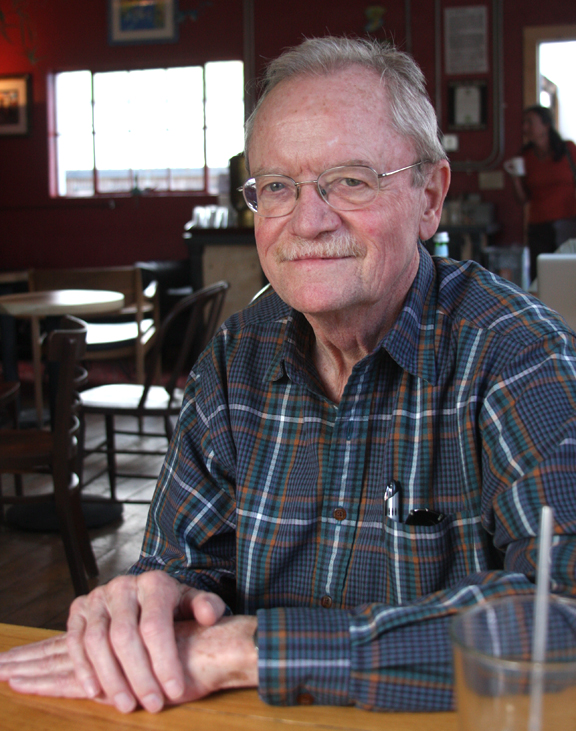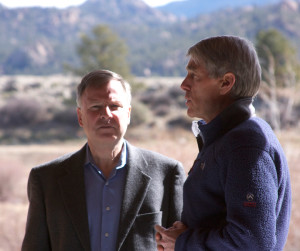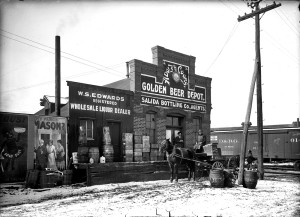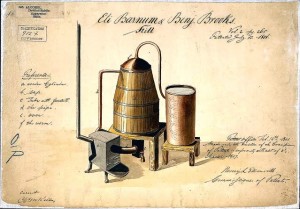A Colorado native, Kent Haruf is the award-winning author of five novels including “Plainsong,” published in 1999, which became a national bestseller and a finalist for the National Book Award, The Los Angeles Times Book Award and The New Yorker Book Award; it won the Mountains & Plains Booksellers Award, The Midland Authors Award, The Salon.com Award and the Alex Award from the American Library Association.
“Eventide” was published as a sequel to “Plainsong” and was released in 2004. It was also a national bestseller and won the Colorado Book Award and was a finalist for the Book Sense Award.
The stories are all set in Holt, Colorado, a fictional town on the Eastern plains. Both novels were adapted for the stage by the Denver Center Theater Company.
In 2009, Haruf was awarded the Dos Passos Prize for Literature and was also the recipient of the Wallace Stegner Award from the Center of the American West in 2012.
He and his wife Cathy currently reside in Salida. He has just released his latest book, “Benediction.”
We asked several of our own book reviewers and published authors to submit questions for this interview and most of those follow.
(Editor’s note: Mr. Haruf died at home in Salida, Colo., on Nov. 30, 2014. He was 71 years old.)
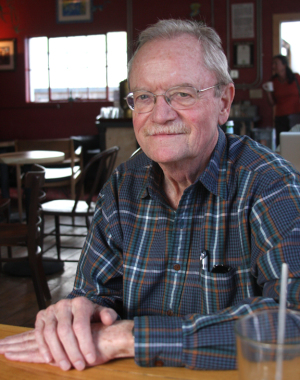
Colorado Central: Why did you and Cathy choose to settle here, rather than the northeastern plains where you grew up and where you’ve also said something akin to having a holy attachment to?
Kent Haruf: That’s a good question and I’ve been asked that several times. I was first asked that question by a reporter for The New York Times and I made the mistake of saying that we lived in the mountains now because my wife wanted to live in the mountains. She saw that in the paper and she said something to the effect of, “Oh, I made you live out here in these beautiful places.” So I knew better the next time than to say that so then I sort of tongue-in-cheek said that “I live in the mountains because it gives me a perspective on the plains.” Cath’ and I both grew up in Colorado and we always knew that we were coming back to Colorado. We didn’t know where but we were sure we would come back.
When we knew each other as kids we lived in Cañon City. Both of us went to high school there. We didn’t want to go back there and we didn’t want to go to any place on the Front Range but we did want to come back to someplace beautiful. We looked around the state a great deal and we chose Salida after our looking. It’s in the mountains, it’s so beautiful. It’s still a real town and had all those details we were looking for. I don’t want to live on the plains now.
I do feel a special affection and a special affinity for the plains. What’s happened is that I’ve formed a kind of mythic notion about the whole country and the whole of Colorado, and in some ways it doesn’t fit the reality of those places, but it’s certainly what I think about and what I write about, so I don’t really need to be out there for my writing anymore. And we choose to live in a beautiful place now.
Colorado Central: Do you find any parallels between the fictional town of Holt and your current home in Salida?
Kent: Not very much. I mean Salida is somewhat bigger than Holt is, probably twice as big. People here are similar, as they are all over the world. There are good people, lots of good people. People are connected here in the way they are in my idea of Holt. There’s certainly a definite feeling of community here, as I think there is in Holt and what it suggests there is. The big difference is, in Salida people choose to move here, and in Holt people are there because of family, because of agriculture and work, but most people would not choose to move to Holt if they came from Philadelphia or Miami or something.
Colorado Central: How do you view your earlier writings? Do you maintain a distance from them, or do you still occasionally want to revise/improve them?
Kent: I always feel that I wish I could improve them when I have read them. But I don’t look at them very much after I’ve finished with them. What I see are mistakes. What I wish I’d had was the energy and the skill to go back and fix the places that I find are not successful. Those are my strong feelings about all these books, including “Benediction.”
[InContentAdTwo]
Colorado Central: How has your writing changed over the decades? Do you still “pull the wool over your own eyes” when you write? (In other words, do you still type with a stocking cap pulled over your eyes, so you’re unable to see what you’re writing?)
Kent: I don’t do that much anymore but I still write the first drafts of my books, the first drafts of scenes working with an old manual typewriter and some old- fashioned yellow paper. That sounds peculiar at least, but the reason I do that is to avoid getting stuck by any individual sentence, so I’m not writing that sentence over and over. I’m avoiding getting stuck by diction or syntax or word choice or grammar or spelling or punctuation, any of those things. I’m simply forcing myself to write a first draft of a scene in one sitting and I don’t allow myself to get up until I’ve written that complete draft of that scene, all on one page, single spaced. It works for me. I don’t know that I’d recommend it to anybody else.
Colorado Central: Was this your idea?
Kent: Yes, I had a graduate student 12 or 13 years ago. He and I were talking about the difficulty of not — if you’re writing on a computer — of not just sitting there and writing the same sentence over and over. When you get into that mode, no sentence seems good enough, even Shakespeare seems amateurish or maudlin, so he and I both decided to try this. I don’t know if he’s still writing, but it worked for me so I’ve kept doing it ever since and I probably will. That requires being a pretty good typist and staying on the home row. I haven’t written anything since I finished “Benediction.” My right hand is not working very well so I’ll have to see if I can still do it that way or not. I still use an old manual Royal typewriter.
Colorado Central: What has it been like having your previous two novels, “Plainsong” and “Eventide,” produced as plays?
Kent: It’s been wonderful. They’ve done terrific jobs of it. They seem to have understood the books thoroughly and they did all kinds of things to make sure they got it as right as they could. I was very hesitant to let them have the rights to do that to begin with because, well, a very bad movie was made of “Plainsong” and after that happened I was hesitant to let anybody else do anything with it. But the artistic director, Kent Thompson, knows eastern Colorado to some degree. His wife is well acquainted with eastern Colorado. Her parents both grew up out there and they were actually friends of my older brothers. So he comes from a family which has had a long connection with eastern Colorado. So I did trust him and we had a long talk about what they wanted to do, how they wanted to do it and so on. I knew pretty well, going into it, that they would do a good job and if anyone could do it, they could do it. In my estimation, they did a very good job of it. They’ve already decided they want to do “Benediction” so I’m pleased about that.
Colorado Central: You didn’t like the movie though?
Kent: I did not like the movie. I thought the movie was simplistic. I thought they dummied it down. I thought they took the sting out of the story. I thought they made the old men, the McPheron brothers, into kind of shuffling, mumbling, retarded old farmers and that’s not the way they are. As I say, they took anything that was controversial out of that story. It was a made-for-television movie and as it turned out, I didn’t have the right to block that movie. Once I sold that to the producer, she had the rights to sell it to anybody else, and she sold it to Hallmark and Hallmark made a typical Hallmark movie. It was made for TV for a Sunday night showing. No controversy, nothing daring at all.
Colorado Central: Has having had your books interpreted on the stage affected your approach to writing?
Kent: Not really. No. The temptation is to try to write a screenplay that is only disguised as a novel. But no, I was aware of that temptation but I’ve tried, I hope successfully, to avoid that completely now. It’s a very different medium of course, and different needs. I don’t think “Eventide” or “Benediction” are at all screenplays or anything like a screenplay. So no, that’s not been a difficulty, really.
Colorado Central: Your books all have a strong association with physical and cultural geography, so what is it about small towns on the high plains that captures your attention? Perhaps a better question: what is the dynamic between landscapes and characters in your novels?
Kent: I’ve been asked that question many times and I’m not sure that I entirely agree with that. From my perspective, when I was in graduate school, trying to figure out what I wanted to write about, or what seemed to be “home” to me, I discovered that where I grew up as a kid in northeastern Colorado, that was the part of the world that I knew best and that I cared about; so way back then I began to set stories in eastern Colorado and I’ve been doing it ever since, because I have a long-range, long-time, long-lived sense of place and a sense of home there. So I didn’t have to invent that feeling, nor did I have to invent any of the details, really, about that country and what it looks like, what it feels like, all that kind of thing.
It’s very convenient to set all my stories out there because I have invented this town of Holt; I do own that county. Like Faulkner said about Yoknapatawpha County, I’m the sole proprietor of that town, of that county. I feel as if I know all the people there and all the dogs and all that stuff. So I can go back to it without having to fumble around and figure out where I am. Also it suits my purposes to not set these stories in a city, a setting which is not complicated by traffic or buildings or commotion or complications of that sort so I’m not having to accommodate for those kinds of details. What I’m most interested in are these individual people. My attempt is to shine a spotlight on these people in a way that I might not be able to if I were in a city.
The other thing that suits me is that on-the-plains humor; nothing can really be hidden out there. Everything is isolated so you see each thing for itself. That suits what I’m trying to write about and how I’m trying to write about these people. Maybe there’s that kind of dynamic between the location and the stories. I suppose the fact that it’s plain suits me too. I know that area well enough to think that if it’s not pretty, it’s at least beautiful. But other people don’t think that way, and I’m certainly not distracted by the beautiful mountains of someplace like Salida.
Colorado Central: Do you consider the landscape a “character”? If so, how does it influence the trajectory of a story, and what role does it play in determining the outcome?
Kent: Well, I don’t think of that. I know people have asked me that a number of times and people think so, but you know, one of the themes of literature can be man against nature but that’s not what these stories are about. Nature plays a role, certainly, but these stories could take place in Denver, or Los Angeles, or Miami or wherever. I mean there are pregnant teenage girls in trouble all over the world. There are old men and mean, darker families everywhere. There are old women up dying over main street in a dark room. People like Dad Lewis are old men dying and families are having to take care of him and those battles are universal elements and universal problems, so I don’t think that applies really. I never thought, in my books, of nature as a character. If you’re reading Jack London, for example, and his Alaska stories, certainly the harsh environment in “Call of The Wild” would be an important element. That particular story could not take place in, oh, Colorado. So in that way I don’t think my stories depended upon location so much. It just suits my purposes, as I’ve already said, to put them out there, for my own private reasons, really.
Colorado Central: Have personal health issues caused you to reflect on mortality as reflected in the character “Dad” in your current novel?
Kent: Well, maybe minimally. I began this book before I really started having the kind of serious medical problems I’ve had in the last two years, so this story was formed in my mind before that. Maybe in the later writing of this book, some of that got into it, I don’t know. Perhaps it did, but I would say more my advancing age, and the fact that I’ve been a hospice volunteer. In fact, Cathy was, and still is deeply involved in hospice. Those experiences had more to do with how this story is portrayed.
The idea of someone dying certainly is a very familiar idea in literature. We’ve been thinking about that forever and probably will continue to for eons. This story is not about suspense. We know from the beginning that Dad Lewis is going to die. The difficulty is trying to portray this man’s death in a way that is not monotonous or tedious, and yet focuses on the meanings he has as he’s closing in on death, and on the family around him and the neighbors, and so on.
When someone dies, it is a reason for people to gather around, and that’s what they begin to do early on in this book, with Dad Lewis, and to care for him and for him to sum up his life in some way, to reflect on his life and to try to make some sense about it before he does pass away. So those are more my concerns than the other thing.
Colorado Central: Have you ever felt stultified by spending so much of your career writing about this small town, in the same way as inhabitants of these homogenous towns sometimes feel suffocated?
Kent: Do I feel stultified by that? No I don’t. I feel, as I’ve already suggested, I feel liberated by that, because I’m not obliged to reinvent the location of every scene in the story. This story is a given. I mean, this place is already there, it exists in my mind, so all I have to do is revive my interest and my thoughts about that place. It’s liberating in a way, for me to feel that way. The intention is not for me, anymore, about getting the details right. I know the details and I want to get them right, but it’s not as if I have to discover them anew each time.
The difficulty, and the challenge, and the fascination for me is to invent new characters and to find new problems for them, and see how they are going to respond to those problems, and how I can make those seem inevitable and realistic and for these people to come together in some probable way. Those are the, for me as a writer, the challenges and the fascinating parts of them.
My daughter asked me the other day if I thought writing was fun. She was being coy; but no I told her I would never think that writing was fun. It’s something else. If it goes fairly well, there’s a deep satisfaction in writing that I get in no other way. I always think of writing as work. I work at it every day, and when I’m writing well, I work at it seven days a week. In my own experience, I never wait or expect something like inspiration. I discount that. I think Flannery O’Conner said that she had to be there every day, or she might not be there the day it comes. Well, that’s how I felt. You may not get something every day, but you’ve got to be there every day to work at it and eventually something may come to you. I’ve gone off on a tangent, but that’s my thoughts about it.
Colorado Central: What’s the best writing advice you’ve received?
Kent: I received, well, it’s the traditional advice that you hear, but I’d have to say that I’m not ever …. When I was at the graduate school in Iowa, people didn’t give you advice. That’s not how they taught.
I don’t remember any specific advice. You learn by observation and by trial and error and so on. What they told you is that this works, and this doesn’t, and they would not tell you exactly why that was. You figure it out. If I were to give advice, the obvious thing is you have to read enormously, and write continuously. So read, read, read; write, write, write. Also, certain things like paying attention to what’s going on around you.
Henry James said that, “A writer is someone upon whom nothing gets lost.” What he meant by that, I think, is that you’re paying attention to how people talk, and how they move, how they dress, how they respond to things. So I’m an unapologetic eavesdropper and gossiper. Those things are important to me. You’re trying to pay attention to all around you. All kinds of things: you have to read the way that a writer reads. You’re not reading for entertainment anymore. You’re reading to learn how to write. You’re reading, trying to figure out how somebody does something as you read down the page, whether this works or not and if it doesn’t work, why not; and if it does, why?
It’s a different kind of pleasure, but it’s not the old traditional, conventional kind of pleasure reading. You’re trying to find the kind of writing, the kind of style that suits you. If I had a lyrical gift like somebody like James Agee, I might write entirely differently. I don’t have that so I have gone very consciously in the other direction. I’ve tried to write as cleanly and simply and directly as I can without being simpleminded or simplistic. That’s an effort that a writer has to figure out about him- or herself, I think. You find the writers that are most important and see what you can learn from those particular writers. Not every writer will teach you anything, but you find the writers that you most have a connection with.
Colorado Central: Do you have any favorite authors?
Kent: When I was in college I had not read a great deal of good literature. I had read quite a lot but not good literature. When I came across Hemingway and Faulkner in an American literature class, they shocked me. I’ve never gotten over the shock. I read both of them regularly when I’m trying to write myself, just to get myself back into the mode of paying attention to sentences. So those two preeminently, and more recently I would say Chekhov; I read him a great deal, over and over and over. So those three. The Native American writer, James Welch, his first book “Winter in the Blood,” was an extremely important book for me. Many others. You’re influenced by so many writers, but those three or four are the ones that come to mind immediately now.
Colorado Central: Are you ready to retire, like Philip Roth, or not for awhile yet?
Kent: I’m not ready to retire yet. I hope. I have a novel that’s sort of vaguely beginning to form at the back of my mind, and I hope I’ll have the energy and the patience to write it. I’m a very slow writer, and I think I’ve gotten slower. This last book has taken about six years to write, so we’ll see what happens.
No, I don’t think of myself as retired. I have other ideas. At this point in my life I can see it’s more a matter of having the energy. I have enough memory left to see if I can do it.
Colorado Central: Thank you for your time today.
Thanks to those who contributed questions for this interview: Annie Dawid, Laura Hendrie, Bill Hatcher and Eduardo Rey Brummel.

